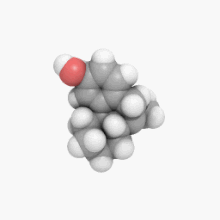右啡烷
外觀
 | |
 | |
| 臨床資料 | |
|---|---|
| 其他名稱 | DXO, Dextrorphanol |
| ATC碼 |
|
| 法律規範狀態 | |
| 法律規範 |
|
| 識別資訊 | |
| |
| CAS號 | 125-73-5 |
| PubChem CID | |
| ChemSpider | |
| UNII | |
| ChEMBL | |
| CompTox Dashboard (EPA) | |
| ECHA InfoCard | 100.004.323 |
| 化學資訊 | |
| 化學式 | C17H23NO |
| 摩爾質量 | 257.38 g·mol−1 |
| 3D模型(JSmol) | |
| |
| |
右啡烷(Dextrorphan,DXO)是一種嗎啡類的精神藥物,具有鎮咳與止咳,或作為解離性致幻劑的作用,也是外消旋嗎汎的右旋對映體,另一個左旋對映體則是左旋嗎汎。右啡烷是右美沙芬由CYP2D6酶經O-脫甲基(O-demethylated)而生成的,作為一種NMDA拮抗劑,右啡烷可產生右美沙芬所帶來的精神效應。[2]
藥理學
[編輯]藥效學
[編輯]| 位置 | Ki (nM) | 對象 | 引用 |
|---|---|---|---|
| NMDAR (MK-801) |
486–906 | 鼠 | [4] |
| σ1 | 118–481 | 鼠 | [4] |
| σ2 | 11,325–15,582 | 鼠 | [4] |
| MOR | 420 >1,000 |
鼠 人 |
[4][7] |
| DOR | 34,700 | 鼠 | [4] |
| KOR | 5,950 | 鼠 | [4] |
| SERT | 401–484 | 鼠 | [4] |
| NET | ≥340 | 鼠 | [4] |
| DAT | >1,000 | 鼠 | [4] |
| 5-HT1A | >1,000 | 鼠 | [4] |
| 5-HT1B/1D | 54% at 1 μM | 鼠 | [4] |
| 5-HT2A | >1,000 | 鼠 | [4] |
| α1 | >1,000 | 鼠 | [4] |
| α2 | >1,000 | 鼠 | [4] |
| β | 35% at 1 μM | 鼠 | [4] |
| D2 | >1,000 | 鼠 | [4] |
| H1 | 95% at 1 μM | 鼠 | [4] |
| mAChRs | 100% at 1 μM | 鼠 | [4] |
| nAChRs | 1,300–29,600 (IC50) |
鼠 | [4] |
| VDSCs | ND | ND | ND |
| 除非另加說明,否則以上所示數值均為Ki(nM)。數值越小,說明藥物與該位點的結合力越強。 | |||
右啡烷的藥理作用類似於右美沙芬。不過,右啡烷作為NMDA受體拮抗劑的效力要強得多,作為SRI的活性也低得多。不過右啡烷仍保留了右美沙芬作為NRIs時的活性。[8]並且其對阿片受體的親和力也較右美沙芬強,且高劑量下更強。
藥代動力學
[編輯]右啡烷的生物半衰期長於其母體化合物,因此在重複服用正常劑量的右美沙芬製劑後容易在血液中蓄積。其還會被CYP3A4進一步轉化為3-羥基嗎啡喃或被葡萄醣醛酸化。[9]
研究
[編輯]右啡烷曾被開發用於治療中風,也已進行了II期臨床試驗,但開發工作已經中止。[10]
參考文獻
[編輯]- ^ Bensinger, Peter. Dextrophan and Nalbuphine; Removal from Schedules (PDF). NARA. October 1, 1976 [June 26, 2023]. (原始內容存檔 (PDF)於2023-06-27).
- ^ Zawertailo LA, Kaplan HL, Busto UE, Tyndale RF, Sellers EM. Psychotropic effects of dextromethorphan are altered by the CYP2D6 polymorphism: a pilot study. Journal of Clinical Psychopharmacology. August 1998, 18 (4): 332–337. PMID 9690700. doi:10.1097/00004714-199808000-00014.
- ^ Roth BL, Driscol J. PDSP Ki Database. Psychoactive Drug Screening Program (PDSP). University of North Carolina at Chapel Hill and the United States National Institute of Mental Health. [14 August 2017]. (原始內容存檔於2023-01-01).
- ^ 4.00 4.01 4.02 4.03 4.04 4.05 4.06 4.07 4.08 4.09 4.10 4.11 4.12 4.13 4.14 4.15 4.16 4.17 4.18 4.19 Nguyen L, Thomas KL, Lucke-Wold BP, Cavendish JZ, Crowe MS, Matsumoto RR. Dextromethorphan: An update on its utility for neurological and neuropsychiatric disorders. Pharmacol. Ther. 2016, 159: 1–22. PMID 26826604. doi:10.1016/j.pharmthera.2016.01.016.
- ^ Werling LL, Keller A, Frank JG, Nuwayhid SJ. A comparison of the binding profiles of dextromethorphan, memantine, fluoxetine and amitriptyline: treatment of involuntary emotional expression disorder. Exp. Neurol. 2007, 207 (2): 248–57. PMID 17689532. S2CID 38476281. doi:10.1016/j.expneurol.2007.06.013.
- ^ Taylor CP, Traynelis SF, Siffert J, Pope LE, Matsumoto RR. Pharmacology of dextromethorphan: Relevance to dextromethorphan/quinidine (Nuedexta®) clinical use. Pharmacol. Ther. 2016, 164: 170–82. PMID 27139517. doi:10.1016/j.pharmthera.2016.04.010
 .
.
- ^ Raynor K, Kong H, Mestek A, Bye LS, Tian M, Liu J, Yu L, Reisine T. Characterization of the cloned 人 mu opioid receptor. J. Pharmacol. Exp. Ther. 1995, 272 (1): 423–8. PMID 7815359.
- ^ Pechnick RN, Poland RE. Comparison of the effects of dextromethorphan, dextrorphan, and levorphanol on the hypothalamo-pituitary-adrenal axis. The Journal of Pharmacology and Experimental Therapeutics. May 2004, 309 (2): 515–522. PMID 14742749. S2CID 274504. doi:10.1124/jpet.103.060038.
- ^ Yu A, Haining RL. Comparative contribution to dextromethorphan metabolism by cytochrome P450 isoforms in vitro: can dextromethorphan be used as a dual probe for both CTP2D6 and CYP3A activities?. Drug Metabolism and Disposition. November 2001, 29 (11): 1514–20 [2023-10-01]. PMID 11602530. (原始內容存檔於2020-03-12).
- ^ Dextrorphan - AdisInsight. [2023-10-01]. (原始內容存檔於2021-07-05).
